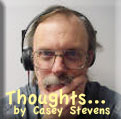- By Casey Stevens
- Opinions
 Print
Print  Ah, hazy days of summer. Lazy days of summer. Thoughts don't need to be lengthy, or difficult. Or deep. Keep it brief, and focused this week, right?
Ah, hazy days of summer. Lazy days of summer. Thoughts don't need to be lengthy, or difficult. Or deep. Keep it brief, and focused this week, right?A favorite author of mine (I guess I have several favorites, but perhaps this one tops my list because he never disappointed me, like the others occasionally) is E.B. White. He was a staff writer for the New Yorker for years. Also a fine creator of such gems as Charlotte's Web and Second Tree From The Corner.
White's granddaughter has edited some of White's thoughts, poems and letters entitled 'On Democracy' and has been published this summer by Harper. Much of it was written in the middle of World War II when it was not clear (prior to D-Day) that democratic forces would win out over totalitarianism. May I give you an extended quote? It seems as relevant today as in 1943: "...Democracy is the recurrent suspicion that more than half the people are right more than half the time. It is the feeling of privacy in the voting booth, the feeling of communion in the libraries, the feeling of vitality everywhere. Democracy is a letter to the editor. Democracy is the score at the beginning of the ninth. It is an idea which hasn't been disproved yet, a song the words of which have not gone bad." FDR used to quote that one to friends.
That's poetry. And it flies high, as so much of White's thinking in prose. His humor (wry, skeptical) is also something to marvel at. He complained (here comes 2019, again, in 1943) that the word 'fascist' had become problematic: "...it is getting so a fascist is a man who votes the other way." And, long before 'fake news' it was White who opined: "...I have yet to see a piece of writing, political or non-political, that doesn't have a slant. All writing slants the way a writer leans, and no man is born perpendicular." Gentle man, gentle and probing words. So awesomely and simply put to paper.
Mad Magazine has finally, in its own inimitable way, bowed out of the 21st century. Probably because of the associated demise of the print media in general, Alfred E. Newman finally has the answer to the musical question of the 60's: "What? Me worry?" No more Mad at newsstands, which seem to have gone the way of the phone booth and the dodo bird. Oh, and civility in political discourse. I digress.
I was forbidden to read Mad, as a teen, and I had to read it secretly at a friend's house. Comic books were 'bad for you', you know, but I could see the contradiction inherent in adult thinking (as Mad so aptly could point out). If Dick Tracy, Peanuts, Pogo and Steve Canyon were OK on Sunday after church, why and how could comic books, and Mad (hardly a comic book) be bad?
Oh, wait a minute, my pre-teen and teen brain said: it's not the format, it's the implicit anarchy of Mad that they feared. The twisted humor, and eminent logic of the preposterous adult world was skewered and held up for the world of us kids to see and guffaw, snickering at the naked emperors 'in charge'. The parodies of television (remember the little banner every month which pled: "Bring back Route 66?"), ridiculous products and humor taken to the very edge of ludicrous; a monthly tableau of anarchy. Of course adults hated it. We believed kids like us wrote it and published it. Ah, Spy vs Spy!!!
Now our parents are mostly gone, we're in our crotchety post-Mad sixties and seventies, and Mad's sales went south. I have a sense that so did America's sense of humor. If the resident of the White House has no sense of humor, then where will America get theirs?
William Gaines founded Mad, and prior to that auspicious idea he published comic books with crime themes. Congressional critics looked at his work, and the American scene, and called hearings with Gaines as a prime witness to see if they could pin 'juvenile delinquency' influencer on creations such as his.
Gaines, according to contemporary reports, spoke to the assembled and noted Congressional headline grabbers of the time, thus: "...the truth is that delinquency is the product of real environment, in which a child lives, and not of the fiction he reads."
I find it quietly amazing, perhaps even comforting, that the wisdom of the forties, fifties and sixties (maybe I'm just an old man, after all) seems to have even more relevance to us as quiet voices like E.B. White and William Gaines (well, not so quiet, I guess in the case of Mad) speak to us from the 'past'. Maybe we find the 'present' more entertaining (we did elect a reality show host to lead us) but we should also find the 'past' more enlightening. I'll continue reading the White essays, while searching for someone who kept all of those past issues of Mad Magazine. Bring back Route 66, indeed.
v15i27



